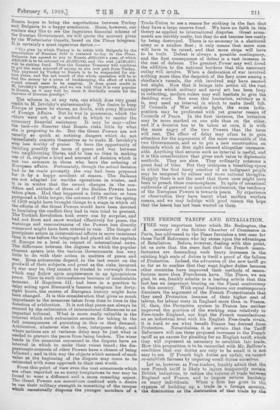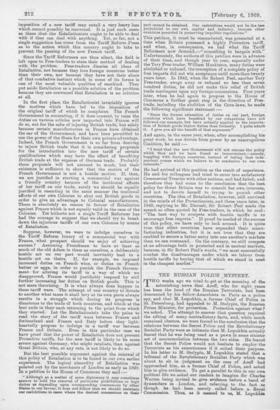THE FRENCH TARIFF AND RETALIATION. T HE very important letter which
Mr. Bodington, the secretary of the British Chamber of Commerce in Paris, has addressed to the Times furnishes a test ease for those Tariff Reformers who lay stress upon the advantages of Retaliation. Before, however, dealing with this point, let us note that the mere fact that the French menu lecturers are demanding such heavy increases in the existing high scale of duties is itself a proof of the failure of Protection. Indeed, the advocates of the new tariff go so far as to confess that they want higher duties becauee other countries have improved their methods of manu- facture more than Frenchmen have. The Times, we are glad. to see, frankly admits in a leading article that this. fact has an important bearing on the Fiscal controversy in this country. With equal frankness our contemporary dismisses the argument of the French Protectionists that they need Protection because of their higher cost of labour, for labour costs in England more than in France. If, then, the Protective system in France has neither improved the position of the working man relatively to Free-trade England, nor kept the French manufacturer on an industrial level with his English Free-trade it is hard to see what benefit Frauce has derived from Protection. Nevertheless, it is certain that the Tariff Reformers will use these proposed, increases in the Freneli tariff as an excuse for pleading for an English tariff, which they will represent as necessary to establish fair trade, How this proposition is to be reconciled with Mr. Balfour's condition that our duties are only to be small it is not easy to see. I French high duties are unfair, we cannot re-establish fairness by imposing small duties ourselves. Let us, hewever, as Free-traders, frankly admit that the new French tariff is likely to injure temporarily certain British industries, to reduce the volume of trio between England and France, and to impose serious hardship on many individuals. When a firm has gone to tbo expense of building up a trade in a foreign country, the diminution or the destruction of that trade by the imposition of a. new tariff may entail a very heavy loss which cannot possibly be recovered. It is just such cases as these that the Retaliationists ought to be able to deal with if they can deal with anything. Yet, so far, not a single suggestion has come from the Tariff Reform Press as to the action which this country ought to take to prevent the passing of the new French tariff.
Since the Tariff Reformers are thus silent, the field is left open to Free-traders to state their method of dealing with the problem. Free-traders dismiss all ideas of Retaliation, not because they love foreign countries better than their own, nor because they have not their share of that combative instinct which in some of its forms is one of the most valuable qualities of mankind. They put aside Retaliation as a possible solution of the problem because they are convinced that Retaliation is no solution at all.
In the first place, the Retaliationist invariably ignores the motives which have led to the imposition of the original tariff of which he complains. The French Government in consenting, if it does consent, to raise the duties on various articles now imported into France will do so, not for the sake of injuring British trade, but solely because certain manufacturers in France have obtained the ear of the Government, and have been permitted to Use the power of the State for their own private advantage. Indeed, the French Government is so far from desiring to injure British trade that it is considering proposals for the introduction into the new tariff of certain qualifications which may have the effect of benefiting British trade at the expense of German trade. Probably these proposals will not amount to much, but their existence is sufficient to show that the motive of the French Government is not a hostile motive. If, then, we are justified in starting a commercial war against a friendly country because of the incidental effects of her tariff on our trade, surely we should be equally justified in resenting in the same manner the continual efforts of our own Colonies to shut out British goods in order to give an advantage to Colonial manufacturers. There is absolutely no reason in favour of Retaliation against France which is not equally valid in the case of the Colonies. Yet hitherto not a single Tariff Reformer has had the courage to suggest that we should try to break down the injurious tariffs of our own Colonies by means of Retaliation.
' Suppose, however, we were to indulge ourselves in the Tariff Reform luxury of a commercial war with France, what prospect should we enjoy of achieving success ? Assuming Frenchmen to have at least as much of the old Adam in them as ourselves, a deliberately hostile act on our part would inevitably lead to a. hostile act on theirs. If, for example, we imposed increased duties on French wine, or duties on French butter or eggs, in order to punish the French Govern- ment for altering its tariff in a way of which we disapproved, France would justifiably respond by still further increasing her duties on British goods. This is not mere theorising. It is what always does happen in these tariff wars. The attempt of one country to dictate to .another what taxes it shall levy at its own ports always results in a struggle which during its progress is disastrous to the trade Of both countries, and which at the best ends in their each returning to the point from which they started. Let the Retaliationists take the pains to read the story of the tariff wars between France and Switzerland and France and Italy before they light- heartedly propose to indulge in a tariff war between France and Britain. Even in this particular case we have proof that the power of Retaliation does not prevent Protective tariffs, for the new tariff is likely to be more severe against Germany, who might retaliate, than against Great Britain, who, at any rate, is not likely to do so.
But the best possible argument against the renewal of this policy of Retaliation is to be found in our own earlier experience. The logical absurdity of Retaliation was pointed out by the merchants of Loudon as early as 1820. In a petition to the House of Commons they said:— " Although as a matter of mere diplomacy it may sometimes answer to hold the removal of particular prohibitions or high duties as depending upon corresponding concessions by other States in our favour, it does not follow that we should maintain our restrictions in cases where the desired conoessions on their
part cannot be obtained. Our restrictions would not be the lees prejudicial to our own capital and industry, because other countries persisted in preserving impolitic regulations."
This petition, it must be remembered, was presented at a time when Britain possessed a highly Protective tariff, and when, in consequence, we had what the Tariff Reformers now demand,—" something to bargain with." Unfortunately, the authors of this petition were in advance of their time, and though year by year, especially under the Tory Free-trader, William Huskisson, many duties were abolished or reduced, the conception of a complete policy of free imports did not win acceptance until more than twenty years later. In 1842, when Sir Robert Peel, another Tory Free-trader, swept away or reduced no less than seven hundred duties, he did not make this relief of British trade contingent upon any foreign concessions. Four years later, when he had again to propose to the House of Commons a further great step in the direction of Free- trade, including the abolition of the Corn-laws, he made the following significant statement :— "Since the former relaxation of duties on our part, foreign countries which have benefited by our relaxations have not followed our example, but have actually applied to the importa- tion of British goods higher duties than formerly. I quite admit it. I give you all the benefit of that argument.'
And again, in the same year, when, after accomplishing his great work, he was driven from power by an unscrupulous Coalition, he said :- "I trust that the new Government will not resume the policy which they and we have found so inconvenient, —namely, haggling with foreign countries, instead of taking that inde- pendent course which we believe to be conducive to our own interests."
He had arrived at this position as the result of experience. He and his colleagues had tried to enter into satisfactory Commercial Treaties with other nations, and had failed; and therefore they had come to the conclusion that the best policy for Great Britain was to consult her own interests, and not to devote herself to trying to punish other countries. The idea of Retaliation, however, still survived in the minds of the Protectionists, and three years later, in 1849, replying to Mr. Disraeli, Sir Robert Peel made the speech so often quoted by Free-traders, in which he said: " The best way to compete with hostile tariffs is to encourage free imports." If proof be needed of the success of this policy, we have only to look around. It is quite true that other countries have expanded their manu- facturing industries, hut it is not true that they are enabled to secure a better entry into one another's markets than we can command. On the contrary, we still compete at an advantage both in protected and in neutral markets, because, in Sir Robert Peel's words, "we most successfully combat the disadvantages under which we labour from hostile tariffs by buving that of which we stand in need in the cheapest market."










































 Previous page
Previous page